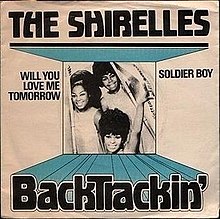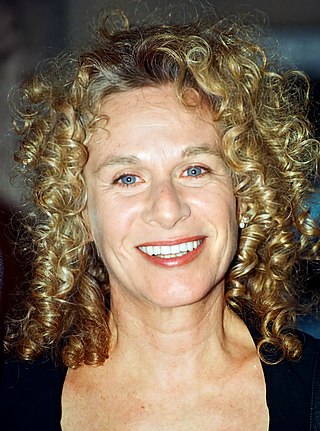
Carole King Klein is an American singer-songwriter and musician who has been active since 1958. One of the most successful female songwriters of the latter half of the 20th century in the US, she wrote or co-wrote 118 pop hits on the Billboard Hot 100. She also wrote 61 hits that charted in the UK, making her the most successful female songwriter on the UK singles charts between 1962 and 2005.
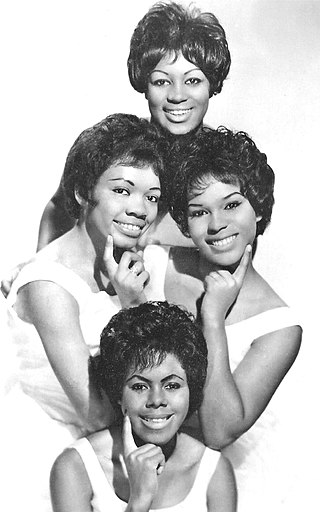
The Shirelles were an American girl group formed in Passaic, New Jersey in 1957. They consisted of schoolmates Shirley Owens, Doris Coley, Addie "Micki" Harris, and Beverly Lee.

The Crystals are an American vocal group that originated in New York City. Considered one of the defining acts of the girl group era in the first half of the 1960s, their 1961–1964 chart hits – including "There's No Other ", "Uptown", "He's Sure the Boy I Love", "He's a Rebel", "Da Doo Ron Ron" and "Then He Kissed Me"– featured three different female lead singers and were all produced by Phil Spector. The latter three songs were originally ranked number 263, number 114, and number 493, respectively, on Rolling Stone magazine's list of The 500 Greatest Songs of All Time. However, two songs were omitted from the magazine's 2010 update, leaving only "He's a Rebel" at number 267. In the 2021 update, "Da Doo Ron Ron" was added back to the list at number 366.

Gerald Goffin was an American lyricist. Collaborating initially with his first wife, Carole King, he co-wrote many international pop hits of the early and mid-1960s, including the US No.1 hits "Will You Love Me Tomorrow", "Take Good Care of My Baby", "The Loco-Motion", and "Go Away Little Girl". It was later said of Goffin that his gift was "to find words that expressed what many young people were feeling but were unable to articulate."

Tapestry is the second studio album by American singer-songwriter Carole King, released on February 10, 1971 on Ode Records and produced by Lou Adler. The album's lead singles, "It's Too Late" and "I Feel the Earth Move", spent five weeks at number one on both the Billboard Hot 100 and Easy Listening charts.

"I'm Gonna Make You Love Me" is a soul song most popularly released as a joint single performed by Diana Ross & the Supremes and the Temptations for the Motown label. This version peaked for two weeks at No. 2 on the Hot 100 in the United States, selling 900,000 copies in its first two weeks, and at No. 3 on the UK Singles Chart in January 1969.

"(You Make Me Feel Like) A Natural Woman" is a 1967 song by American soul singer Aretha Franklin released as a single by the Atlantic label. The words were written by Gerry Goffin from an idea by Atlantic producer Jerry Wexler, and the music was composed by Carole King. Written for Franklin, the record reached number 8 on the Billboard Hot 100, and became one of her signature songs. It made history on the UK Singles Chart a week after her death, finally becoming a hit almost 51 years after it was first released, entering at No. 79. Franklin also included a live recording on the album Aretha in Paris in 1968.

"The Loco-Motion" is a 1962 pop song written by American songwriters Gerry Goffin and Carole King. "The Loco-Motion" was originally written for R&B singer Dee Dee Sharp, but Sharp turned the song down.

"Happy Birthday Sweet Sixteen" is a pop song released in 1961 by Neil Sedaka. Sedaka wrote the music and performed the song, while the lyrics were written by Howard Greenfield. The song is noted for being similar in musical structure to Take Good Care of My Baby by Bobby Vee, and additionally for its resemblance to the melody of the Chiffons' subsequent 1963 hit "One Fine Day". Both of these songs exhibiting similarity to "Happy Birthday Sweet Sixteen" were penned by the team of Carole King and Gerry Goffin. The song reached #6 on the Billboard Hot 100 chart and No. 3 on the UK Singles Chart.

"Oh No Not My Baby" is a song written by Gerry Goffin and Carole King. The song's lyrics describe how friends and family repeatedly warn the singer about a partner's infidelities. The song is regarded as an American standard due to its long-time popularity with both music listeners and recording artists.
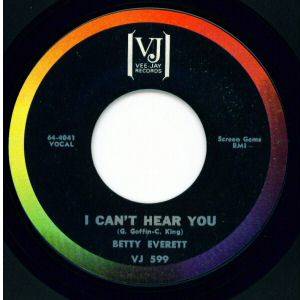
"I Can't Hear You No More" is a composition written by Gerry Goffin and Carole King. It was originally recorded as "I Can't Hear You" in 1964 by Betty Everett. The most successful version was the 1976 top 40 single by Helen Reddy.

"Go Away Little Girl" is a popular song written by Gerry Goffin and Carole King. It was first recorded by Bobby Vee for Liberty Records on March 28, 1962. The lyrics consist of a young man asking a young attractive woman to stay away from him, so that he will not be tempted to betray his steady girlfriend by kissing her. The song is notable for making the American Top 20 three times: for Steve Lawrence in 1963, for The Happenings in 1966, and for Donny Osmond in 1971. It is also the first song, and one of only nine, to reach US number 1 by two different artists. Also notable in each of the solo versions is the similar double-tracked treatment of the singer's voice.

"One Fine Day" is a song written by Gerry Goffin and Carole King. It first became a popular hit in the summer of 1963 for American girl group the Chiffons, who reached the top five on the Billboard Hot 100 chart. In 1980, King covered it herself and charted at No. 12 on the Hot 100 with her version, becoming her last top 40 hit. The song has subsequently been covered by numerous artists over the years.
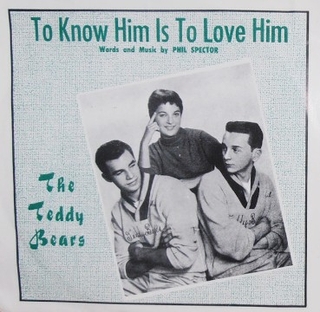
"To Know Him Is to Love Him" is a song written by Phil Spector, inspired by words on his father's tombstone, "To Know Him Was to Love Him." It was first recorded by the only vocal group of which he was a member, the Teddy Bears. Their recording spent three weeks at No. 1 on the Billboard Hot 100 chart in 1958, while reaching No. 2 on the UK's New Musical Express chart. Peter & Gordon and Bobby Vinton later had hits with the song, with its title and lyrics changed to "To Know You Is to Love You". In 1987, the song was resurrected by Dolly Parton, Linda Ronstadt, and Emmylou Harris, whose Trio recording topped the U.S. country singles chart.
"Tonight, I Celebrate My Love" is a romantic ballad written by lyricist Gerry Goffin with Michael Masser and recorded by Peabo Bryson and Roberta Flack for their 1983 album of duets, Born to Love, issued as the lead single. The track—produced by Masser—became a million-selling international hit.

"Halfway to Paradise" is a popular song written by Carole King and Gerry Goffin. In the United States, the song was originally recorded in 1961 by Tony Orlando where it peaked at No. 39 on the Hot 100. In Canada, the song reached No. 3 in the CHUM Charts.

"I Know (You Don't Love Me No More)" is an R&B song written and recorded by American singer Barbara George, released as her debut single in 1961. It became her signature song and her only major hit in United States, reaching No.1 on the Billboard R&B singles chart and No.3 in the Hot 100. It was later covered by various artists, inducing Fats Domino, Cher, Ike & Tina Turner, and Bonnie Raitt. A Spanish version by Marisela topped Billboard's Latin chart in 1988. The Shirelles borrowed the melody of "I Know" for their 1963 cover of "Everybody Loves A Lover".

Emotions is the fourth studio album by American singer Brenda Lee. The album was released on April 3, 1961 on Decca Records and was produced by Owen Bradley. It was one of two studio albums released by Lee in 1961 and its title track became a Top 10 hit on the Billboard Hot 100 the same year.

"I Can't Stay Mad at You" is a song written by Gerry Goffin and Carole King. It was originally recorded by American country artist Skeeter Davis, becoming her second top-ten hit on the Billboard Hot 100 in 1963. "I Can't Stay Mad at You" followed on the popular success of Davis' earlier 1963 crossover hit "The End of the World". The song was one of the first Goffin-King compositions to be recorded by a country music performer.

"Yours Until Tomorrow" is a song written by Gerry Goffin and Carole King, recorded by Dee Dee Warwick in 1968. It was used as the B-side to her recording of "I'm Gonna Make You Love Me." Versions by, respectively, Vivian Reed and Gene Pitney performed on music charts.
